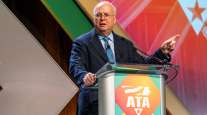Senior Reporter
ATA's Osiecki Expects Favorable Reforms If Congress Passes Highway Bill

PHILADELPHIA — Dave Osiecki, American Trucking Associations’ executive vice president and chief of national advocacy, is optimistic regulations the industry has criticized over the years would be reformed if Congress advances key bills this year.
Speaking to executives at ATA’s Management Conference & Exhibition here Oct. 19, Osiecki specifically referred to the Federal Motor Carrier Safety Administration’s Compliance, Safety, Accountability scoring program.
A six-year House bill the Transportation and Infrastructure Committee is scheduled to consider Oct. 22 would require FMCSA to present Congress with a plan for reforming CSA. The bill also paves a path for temporarily removing from public view certain CSA data.
“There’s good reform language in the House bill that was just introduced by the chairman [Bill Shuster] in his committee. There’s also good reform language in the Senate highway bill, which has already been passed by the Senate. So a lot of good work on CSA, and we will get some good reforms that are needed and have been needed for a number of years, if those bills pass,” Osiecki said.
Earlier, an audience at the conference here cheered Shuster when he told them the bill would reform CSA.
Osiecki also expressed optimism that congressional leaders would include an hours-of-service provision in an expansive 2016 funding law due out later this year. Already, the House and Senate have advanced fiscal 2016 transportation funding legislation that would expand on the requirements of an hours-of-service study. That study is projected to be unveiled in December.
Under the transportation appropriations bills the chambers passed, before FMCSA’s 34-hour restart rule for truckers is reinstated, the agency must commission a study that addresses whether the rule has safety benefits and whether it is better for drivers in terms of fatigue, health, longevity and work schedules.
Congress temporarily suspended the HOS restart rule last year. Under the suspended restart rule, drivers were required to take a rest break between 1 a.m. and 5 a.m. on two consecutive days.
“We’ve been successful in getting very good language in both the Senate and the House appropriations bills,” Osiecki said, adding, “If Congress finds the will and has the opportunity to bring those appropriations bills together in an omnibus package later this year, we will see some additional relief and make it tougher on the [U.S. Department of Transportation] to reimpose those restart restrictions.”




